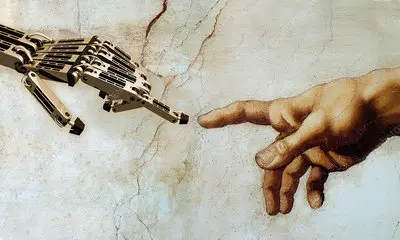
Technical mentorship should be familiar, not nostalgic
- Emma Sterry
- Badass copy, Thought piece
- 13 Aug, 2023
" Remember needing someone to get off the phone so you could ‘surf the web’? Remember the sound of dial up? Remember helping strangers debug on the internet?
Community based technical support is feeling more nostalgic than familiar lately.
And at first glance that makes sense - has a real life colleague ever written you an on the fly Haiku to explain that they're busy? Unlikely. Has that same colleague then gone on to write you a full explanation of your error in under 10 seconds; and in some cases generated working runnable code alongside? Definitely not.
But ChatGPT and CoPilot can.
And these tools are incredible, who doesn’t want a speedy response instead of the slogging wait for upvotes?
It’s not just you - StackOverflow has seen traffic fall by over 2000 questions a day, and the number keeps spiralling down. Added to this, open questions are being answered using bots to mine for reputation points - to the point that moderators have been on strike since June.
In answer, Stackoverflow has launched Overflow AI - a jump to join the market that on the surface seems like a wise choice. But the words of StackOverflow’s founder were wiser - to paraphrase: ‘at some point they’ll need to understand what they’ve built’.
We probably do, yeah. And we more or less do. Typically it’s that same eureka moment when we see the solution, just blunted. ‘Oh yeah, of course’ we go as we do a quick wholesale copy paste.
So what’s the issue?
Usage of Gen AI is most prevalent amongst junior engineers, where nearly 82% of respondents said they are planning to use AI tools during their development. The thing is though, if we can get AI to troubleshoot for us, how do we develop that key skill? Where is that moment of connection, where you work with someone to debug? Because any engineer will tell you, the difference between junior experience and higher isn’t really time, it's the number of errors you’ve seen and unravelled. They know these errors when they flag up because they’ve faced them before, and the complex journey to a solution means they’ve remembered.
Over this cycle, engineers learn how they want to be treated when they ask for help. They remember the arrogance of some, and the patient kindness of others. And in most cases, they pay that kindness forward when they see someone approaching with a laptop in hand a look of total confusion.
So what’s the answer? Wanting to use a tool and being dependent on a tool are two different things. It is more than ok to use Gen AI, in fact we all should be. But it shouldn’t be a first resort when we hit an issue. Still raise it on that forum. Still have that teams call with a peer. Still try to work through that process of untangling it on your own - with a time limit of course.
These tools were trained on scrapes from thriving communities, most of which are now suing for the free use of their data to outcompete. We as a network should make personal connections as conscious a choice as promoting best practice and eating broccoli.
Helping each other should be our current location, not a fair trek down memory lane."